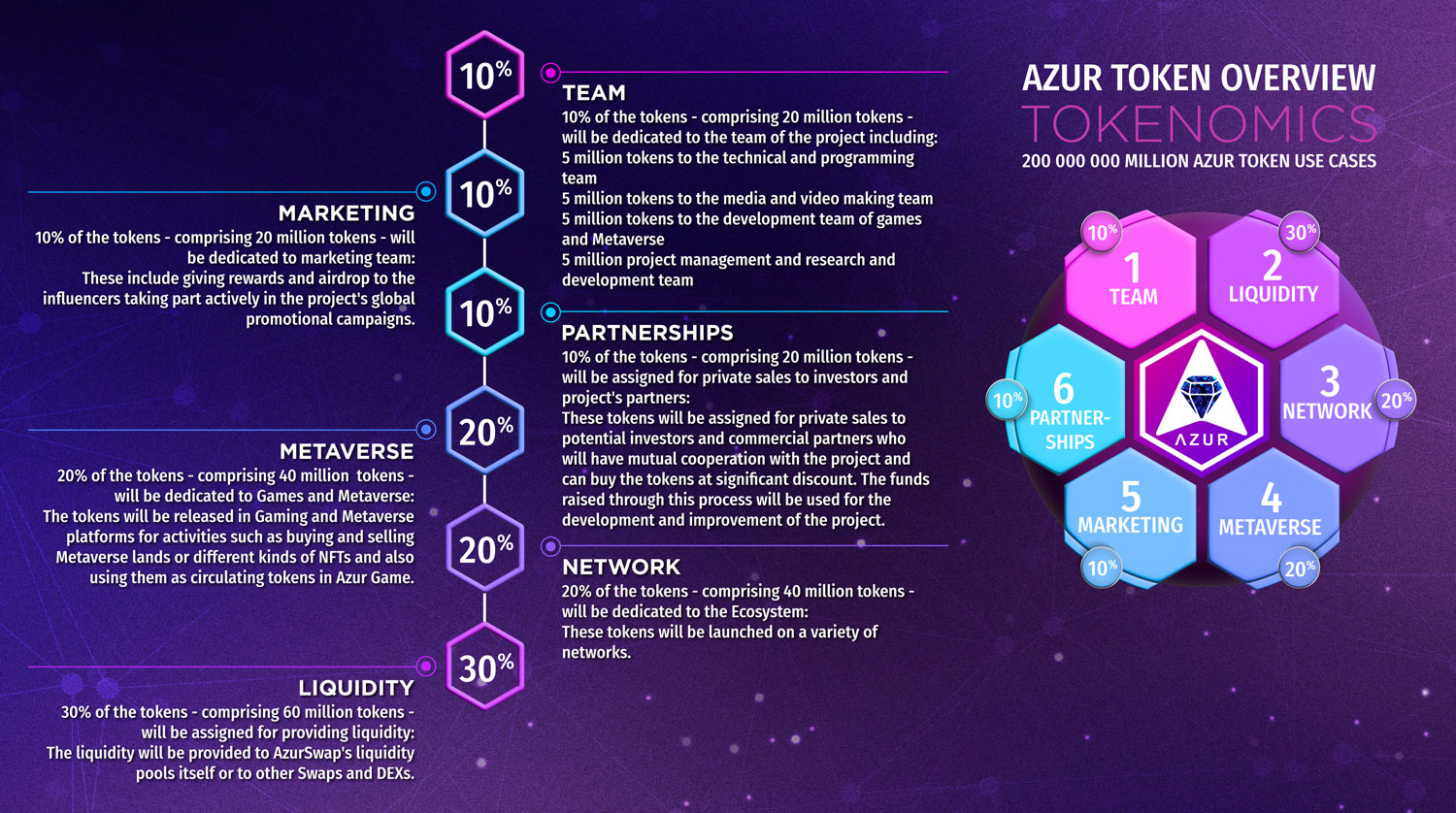AzurToken
Azur Token

At Azur, a remarkable token called AZUR token has been created using the ERC20 standard. This token, bearing the symbol AZUR, was carefully created with the help of OpenZeppelin. By taking advantage of their expertise, we have fortified its trustworthiness and security, ensuring its fitness for future purposes such as:
- Designing various games
- Native Token in Azur Network
- Design and development of various systems and protocols related to AZUR token.
The AZUR token stands out for its simplicity and adherence to the standard, as it avoids incorporating certain features found in other native tokens of other projects. These features, although they may seem beneficial, can actually lead to negative outcomes. For instance, they allow for the updating smart contracts fees for token holders or the project team. Additionally, they utilize 32-bit codes for voting purposes which makes them susceptible to become less decentralized and in control of a few early stakeholders. AZUR token, on the other hand, maintains a straightforward approach without these complexities. Don’t worry, AZUR token is standard and isn’t upgradeable.
There exists a finite number of tokens, with a fixed supply that cannot be increased through any means in the future. Innovative services designed exclusively for AZUR tokens, like the telegram bot and Games in Azur Metaverse, will unlock a plethora of exciting offers and enhanced functionalities.
Initially, AZUR tokens will be launched on the Ethereum network. However, after a while, once the project achieves its desired objectives, they will be migrated to Azur project's independent network and become its native token. It should be noted that AZUR tokens will be deployed in several other popular blockchain networks like Avalanche, Polygon, Binance Chain (BEP20) etc. in the future in order to gain traction and boost users' interaction.
The token is developed using ERC20 standard token design and employing OpenZeppelin libraries. The token is not updatable and this unavailability of access to update the contracts provides users and token holders with peace of mind and more trust to the project. Initially, the AZUR tokens will be launched on the Ethereum network due to its large number of users and wide range of ERC20 tokens available. This allows users to conveniently buy Azur tokens by exchanging them.
The initial number of tokens created is 200 million with 18 decimal digits (like other standard tokens). The specifics regarding how these tokens will be divided up and made available to the public shall be revealed through the announcements channels. Furthermore, within the realm of Azur Metaverse, the issuance of NFT tokens will be contingent upon the AZUR token. Once Azur native blockchain is created and operated, the Azur coin will be officially launched, leading to the burning of these tokens. Consequently, they will be replaced by Wrapped AZUR token (WAZUR).
Tokenomics & Token Address
Details of the tokenomics, including the distribution mechanisms, allocation structures, and key financial aspects, as well as the addresses associated with various Azur Token networks, are outlined below. This comprehensive overview aims to provide a more in-depth understanding of the intricate workings and specificities of the token, shedding light on its diverse functionalities across different network addresses.
Ethereum Network (ETH) : 0xf161cDb9aa33B2F48be273DAE3F3BbB2330Ad3E5

ERC-20 Standard
An ERC-20 token is a standardized digital asset that operates on the Ethereum blockchain, adhering to a set of predefined rules and requirements known as the ERC-20 standard. This standard establishes a common set of functions that must be implemented by any Ethereum token, including the ability to transfer tokens, retrieve the token balance of an account and approve token transfers between accounts. ERC-20 tokens are generated through the utilization of smart contracts, which are self-executing programs running on the Ethereum blockchain. These smart contracts define various attributes of the token, such as its total supply, divisibility into decimal units, and other pertinent information.
ERC-20 tokens can be used for a variety of purposes. For example, they can be used to create new cryptocurrencies, represent tangible or intangible assets, or function as a medium of exchange within decentralized applications (DApps). Notably, they have gained significant traction in initial coin offerings (ICOs), where companies raise capital by offering their ERC-20 tokens in exchange for ether (ETH) or alternative cryptocurrencies.
ERC-20 tokens can be stored in any Ethereum wallet that supports them, and they can be traded on decentralized exchanges (DEXs) or centralized exchanges that is compatible with ERC-20 tokens. ERC-20 is the most popular token standard on the Ethereum blockchain and its widespread adoption has fostered interoperability and standardization within the Ethereum blockchain ecosystem. Consequently, thousands of ERC-20 tokens are currently in circulation.